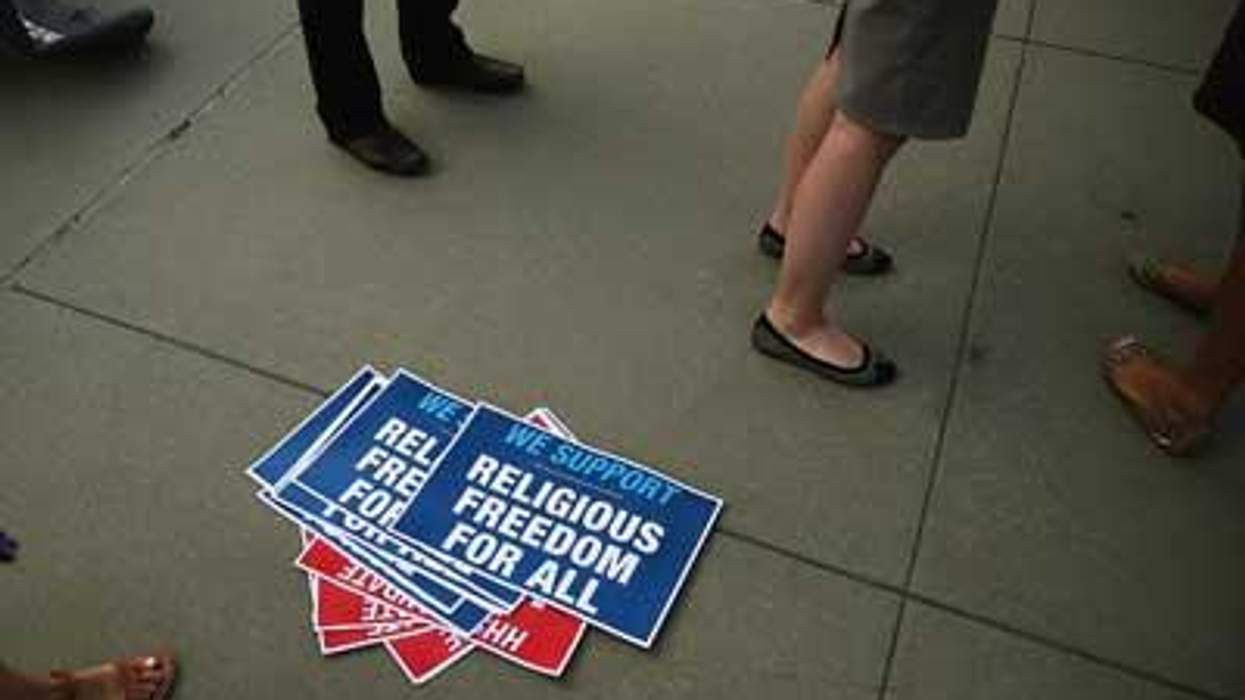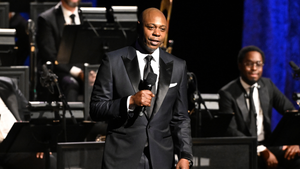LGBT activists have been warning about this scenario. The Supreme Court ruled today that employers have a right to cite their religion as reason to deny employees coverage for contraception, and that leaves some wondering what comes next.
The impact of the court's 5-4 ruling is still being interpreted by legal analysts. But despite assurances from the court that its ruling is "very specific," it could still have far-reaching consequences for LGBT Americans when seeking health care or even, eventually, in their daily lives. The court said Hobby Lobby and other closely held corporations are protected from the government interfering in the exercise of their religion by the Religious Freedom Restoration Act of 1993. The Internal Revenue Service defines a closely held corporation as one in which more than 50 percent of the value of all outstanding stock is owned by five or fewer people.
Activists had warned that if Hobby Lobby and Conestoga Wood Specialties -- the businesses that challenged Obamacare -- could use their "sincerely held religious beliefs" to deny contraception to employees, then they might use the same power to deny health care to transgender people or might withhold coverage for HIV and AIDS treatment to LGBT employees.
Birth control for women is a lot like pre-exposure prophylaxis, or PReP, for gay men, for example. Truvada PReP is a pill taken daily that prevents HIV-negative men from contracting the disease during sex with other men (it can also be used by HIV-negative partners in heterosexual relationships). Hobby Lobby argued that offering coverage for certain types of contraception made them complicit in what amounted to abortion. Obviously, the Christian-owned chain of craft stores is also opposed to gay people having sex with each other, and likely wouldn't want to be complicit in that, either.
Some had warned that depending on the reach of the ruling, business owners might try to use the decision to object to mental health services or substance abuse treatment -- health issues that disproportionately affect LGBT Americans.
Writing for the majority, Justice Samuel Alito was clear that corporations can have sincerely held religious beliefs that are protected by RFRA, saying their owners had not "forfeited all RFRA protection when the decided to organize their businesses as corporations rather than sole proprietorships or general partnerships." Alito suggested it would be discriminatory to interpret the law otherwise. "The plain terms of RFRA make it perfectly clear that Congress did not discriminate in this way against men and women who wish to run their businesses as for-profit corporations in the manner required by their religious beliefs."
The court had to decide whether Obamacare put an unreasonable burden on these owners, and it found that the cost of coverage for contraception would be too great. But the court insists the ruling is "very specific" to Obamacare and isn't a license for employers to discriminate.
"As this description of our reasoning shows, our holding is very specific," wrote Alito. "We do not hold, as the principal dissent alleges, that for-profit corporations and other commercial enterprises can 'opt out of any law (saving only tax laws) they judge incompatible with their sincerely held religious beliefs.'" And Alito insists that corporations do not now "have free rein to take steps that impose 'disadvantages ... on others.'"
Still, LGBT groups -- and dissenting justices -- see the ruling as a possible opening for those who hope to use religious exemptions for their own agendas.
Justice Ruth Bader Ginsburg, in her dissent, noted that she is "mindful of the havoc the Court's judgment can introduce" and went on to explore that. "Although the Court attempts to cabin its language to closely held corporations," she wrote, "its logic extends to corporations of any size, public or private. Little doubt that RFRA claims will proliferate." Indeed, she remarked in a footnote, "'Closely held' is not synonymous with 'small.'" Large companies such as Mars Inc., with 72,000 employees, and Cargill, with 140,000, are closely held.
Ginsburg further wrote, "Until today, religious exemptions had never been extended to any entity operating in 'the commercial, profit-making world.'" Profit-making companies do not exist to further religious goals, and their employees are drawn from a multitude of faiths, she pointed out.
Alito's decision limits the religious accommodation to the contraceptive mandate, saying "other coverage requirements ... may involve different arguments about the least restrictive means of providing them." Ginsburg asserted that the court nonetheless "has ventured into a minefield."
Some LGBT activists agree with Ginsburg. "Religious groups have a long-established First Amendment ability to operate according to their own beliefs," said Human Rights Campaign legal director Sarah Warbelow in a statement. "Instead of protecting religious liberty, this ruling gives license for businesses to use their personal beliefs as a reason to deny people access to basic, yet crucial medical services."
"This was not a victory for any rational definition of 'religious freedom,' but for religious coercion," said Truth Wins Out associate director Evan Hurst in a statement. "This ruling, far from simply being about contraception, is chilling in that it could potentially allow any crackpot who owns a company to deny his employees all kinds of health coverage, simply because his religious beliefs don't allow for them." Added Truth Wins Out founder Wayne Besen: "The Supreme Court may have just sent our nation down an actual slippery slope."
However, an American Civil Liberties Union attorney sees the ruling as narrow and cautions against panic. "I don't think it's a slam dunk," said staff attorney Rose Saxe. There was no similar law exempting religious groups from, say, providing HIV meds, so therefore no such law that could be extended to for-profit companies. The ruling may embolden such companies to claim they could deny HIV meds (including PrEP) or gender-transition procedures, but it does not give them legal cover to do so, she said.
"This decision is not a free pass to engage in gender discrimination or sex discrimination" or to evade the Americans With Disabilities Act, which bans discrimination against people with HIV or AIDS, Saxe said.
The Hobby Lobby case is also closely tied with another movement over religious liberty that directly targets LGBT people: specifically same-sex couples who are legally married.
Salon's Eli Clifton reported earlier this year that the CFO for Hobby Lobby, Jon Cargill, contributed nearly $65 million in 2009 alone to something called the National Christian Charitable Foundation. Clifton named that group as among the biggest contributors to organizations in Arizona that lobbied for SB 1062.
After much outcry, in February Arizona governor Jan Brewer vetoed the bill, which would have allowed business owners to evade antidiscrimination law by citing their religious beliefs. The law never mentioned LGBT people specifically, but it didn't need to.
After outrage spread over Arizona's bill, similar proposals failed to pass in other states, including Kansas, Georgia, Idaho, Maine, South Dakota, and Tennessee, and Indiana. But Mississippi was undeterred, with Gov. Phil Bryant signing the bill, sometimes called a "license to discriminate," into law in April.
Rebecca Isaacs, executive director of Equality Federation, a network of state-level groups, warned that the Supreme Court decision could reinvigorate those hoping to pass these laws at the state level. "The Court's decision is also deeply troubling because it may embolden those who are trying to use religion to trump other anti-discrimination measures," Isaacs said in a statement. "For example, we can expect to see supporters of the Arizona bill that could have allowed businesses to turn away gay customers push again for such measures."
Saxe, however, remained hopeful that there would not be another rash of such legislation. Meanwhile, the legal group Gay and Lesbian Advocates and Defenders underlined the need for continued vigilance.
"While the decision today makes clear that there is no opening for demands to be exempt from nondiscrimination laws, we are very aware of the need to be vigilant," said GLAD interim executive director Gary Buseck in a statement. "Attempts to discriminate against LGBT people are increasingly being articulated as religious expression, as in the case of GLAD's client Matt Barrett. His offer of employment was withdrawn by Fontbonne Academy, a religiously affiliated school, when he noted on a form that his spouse was a man. We have sued on Matt's behalf, and we will continue to fight for him and against any and all attempts to justify discrimination against LGBT people."
Additional reporting by Trudy Ring.



































































Charlie Kirk DID say stoning gay people was the 'perfect law' — and these other heinous quotes